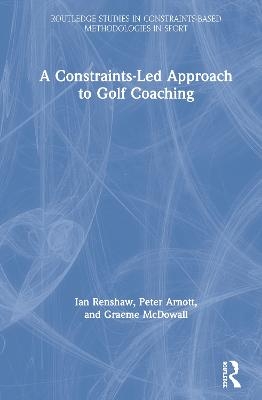
A Constraints-Led Approach to Golf Coaching
Routledge (Verlag)
978-0-367-48268-8 (ISBN)
While the popularity of golf is coming under increased pressure, it continues to hook millions of players. However, the complexity of the game and the extremely high level of precision required to hit the ball consistently well means that it is a game that is difficult to even become ‘good’ at, let alone master. Consequently, irrespective of whether the player is a weekend golfer, a club member, or a tour professional, the search for the key to playing good golf feeds an insatiable desire for ideas and tips to improve golf performance and bring one’s handicap down. However, traditional coaching, with its primary focus on developing the perfect swing is not leading to a reduction in handicaps and the time is ripe for a new approach. This book aims to fill this void and is a landmark text for golf coaches and players about applying a constraints-led approach (CLA) to golf coaching. In this book, two golf coaches, Pete Arnott and Graeme McDowall talk to Ian Renshaw to demonstrate how their practice is driven and inspired by their alignment to a CLA. A Constraints-Led Approach to Golf Coaching includes case studies and examples of how constraints are manipulated to induce adaption in the technical, tactical (or put in golf terms, course management), physiological, and psychological development mechanisms needed to improve at golf. Examples cover coaching from their work with beginners, high handicappers, aspirant tour players, and elite players looking to make the ‘tour’.
Ian Renshaw is an Associate Professor at Queensland University of Technology, Brisbane, Australia. Ian co-authored the Foundation text in this book series (Renshaw, I., Davids, K.D.., Roberts, W., & Newcombe, D. (2019). The Constraints-Led Approach: Principles for Sports Coaching and Practice Design. London: Routledge) and is also a series editor. Ian’s teaching and research interests are centred on applications of ecological dynamics to sport settings. Ian has worked with numerous elite sports teams and national bodies providing coach education and skill acquisition consultations. In his spare time, Ian lives on the golf course. Peter Arnott is a Golf Coach based in Edinburgh, Scotland. Peter obtained his Master’s degree in Science Research in 2019. His thesis involved interviewing 7 European Tour players on their experience of preparing for, and then playing on the European Tour. He has also presented at the English Institute of Sport, World Scientific Golf Conference in St Andrews, Scotland, and to the Rio Olympics 2016 Gold-winning U.K. Women’s field hockey team on effective practice and technique change. As a professional coach, Pete has worked with players of all ability levels from European Tour Players, Mini-Tour Players, competitive youth golfers, elite amateurs, and recreational players alike. Graeme McDowall received an MPhil in Sports Coaching (Education) from the University of Birmingham, UK. He is a Lecturer in Golf and Sport at Scotland’s Rural College (The SRUC) and a member of the Professional Golfers Association of Great Britain and Ireland. His main area of interest is skill acquisition in sport and as well as being a practitioner in this area with the high-performance golf programme at the SRUC, Graeme has delivered numerous skill acquisition presentations at key industry events and has shared his knowledge of this area with many of the world’s leading golf coaches.
1. Introduction: Why we need a new way of golf coaching
2. The Beginner Golfer
3. The High Handicapper
4. So you want to turn Pro?
5. Working with High Performance Groups
6. Epilogue
References
| Erscheinungsdatum | 15.09.2020 |
|---|---|
| Reihe/Serie | Routledge Studies in Constraints-Based Methodologies in Sport |
| Zusatzinfo | 7 Tables, black and white; 11 Line drawings, black and white; 30 Halftones, black and white; 41 Illustrations, black and white |
| Verlagsort | London |
| Sprache | englisch |
| Maße | 156 x 234 mm |
| Gewicht | 830 g |
| Themenwelt | Sport ► Ballsport ► Golf |
| ISBN-10 | 0-367-48268-1 / 0367482681 |
| ISBN-13 | 978-0-367-48268-8 / 9780367482688 |
| Zustand | Neuware |
| Haben Sie eine Frage zum Produkt? |
aus dem Bereich


